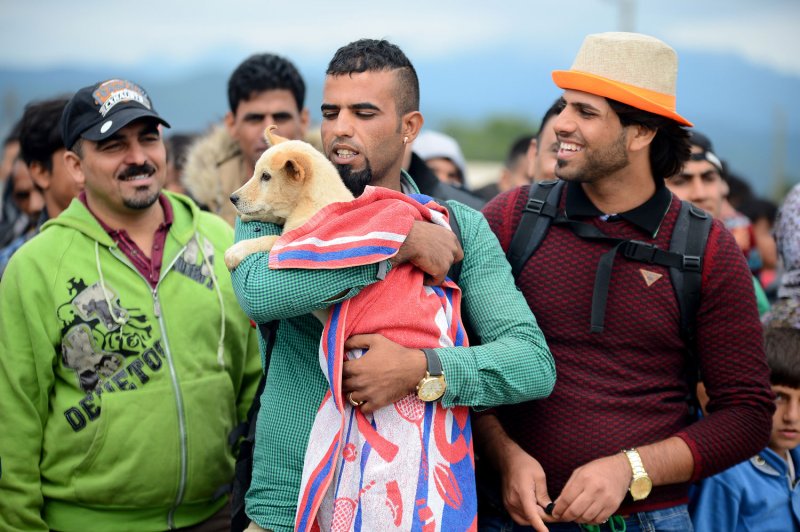1 of 3 | A migrant with his dog waits for a permission to move towards the train station Sept. 8 at a refugee camp near Gevgelija, Macedonia. Photo by Borce Popovski/UPI |
License Photo
BUDAPEST, Hungary, Sept. 15 (UPI) -- Hungary declared a state of emergency in two southern counties Tuesday as a 110-mile razor-wire fence was completed and laws allowing the arrest of illegal immigrants came into effect.
The state of emergency declaration gives police more powers and allows for the deployment of troops, pending approval from Parliament. Mounted police were deployed to patrol the fence along Hungary's border with Serbia.
People who cross the border illegally or damage the new fence will face criminal charges, punishable by imprisonment or deportation.
"We will start a new era," Hungarian government spokesman Zoltan Kovacs said shortly after midnight, when the new laws came into effect. "We will stop the inflow of illegal migrants over our green borders."
More than 9,000 migrants crossed into Hungary before the border was closed.
"That also means that the official and legal ways to come to Hungary and therefore to the European Union remain open," Kovacs added. "That's all we ask from all migrants -- that they should comply with international and European law."
More than 156,000 migrants crossed into the European Union in August, meaning more than 500,000 migrants have entered since the start of the year, EU border agency Frontex said.
About 280,000 people entered the EU in 2014. Most migrants gain entry into the EU through the Greek islands, most of whom then travel toward Hungary.
"The Greek islands continue to be under an intense migratory pressure. Just last week Frontex offered additional staff to help identify and register the new arrivals on Lesbos and Kos, which have been particularly affected," Frontex Executive Director Fabrice Leggeri said in a statement.
During an EU meeting on the migrant crisis on Monday, a majority of ministers agreed in principle to the proposal to relocate 120,000 more migrants through mandatory quotas, on top of the 40,000 proposed in May.
The Czech Republic, Slovakia and Hungary reportedly opposed the quotas. The proposal could be approved at a meeting scheduled for Oct. 8.















